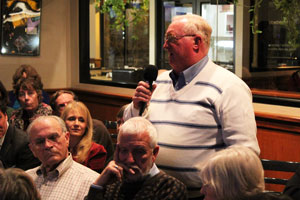
C
Jim Johnson / KGOU


C
Jim Johnson / KGOU

Jim Johnson / KGOU
An audience member takes his turn at the mic to ask lawmakers about the state income tax and sales tax on groceries.
Our State Budget Roadshow wrapped up last night in Stillwater with a packed crowd, pointed policy questions — and pizza.
It was a full house, and the discussion was almost entirely led by the audience, which came chambered with questions about the income tax, the miserable condition of some state-owned buildings, and how the state budget affects life in rural Oklahoma.
The income tax is a hot topic in Oklahoma, and the Stillwater audience — as it was in Tulsa and Oklahoma City — was eager to weigh-in.

Jim Johnson / KGOU
(from left) Agriculture Economist Dave Shideler, Rep. Cory T. Williams, D-Stillwater, and Sen. Jim Halligan, R-Stillwater, paneled a discussion on Oklahoma's state budget and economy.
A retired state health department employee said she’s tired of the “constant rhetoric” that cutting taxes leads to an increase in business spending.
“We’ve been hearing that for a long time, and that doesn’t work,” she said. “I’m concerned about poor people. I don’t want to cut services to the poor. I don’t think this is the time.”
The Stillwater event, which was co-hosted by KOSU, had three panelists. One, Sen. Jim Halligan, R-Stillwater, addressed concerns about the income tax.
From Stillwater NewsPress reporter Ricky O’Bannon:
Halligan has said any move to step down that tax has to be revenue neutral, and he repeated that argument Tuesday … A task force examined various tax credits since the last session and has recommended a moratorium on all the credits to allow lawmakers to alter or eliminate some credits. But Halligan said that will be a difficult process.

Joe Wertz / NPR StateImpact
Sen. Jim Halligan, R-Stillwater, talks with audience members after a state budget forum in Stillwater.
Another panelist, Rep. Cory T. Williams, D-Stillwater, said he’s against eliminating the income tax entirely. He would, however, support an income tax reduction if enough revenue is added by eliminating ineffective tax credits.
Williams suggested — as did economist Mickey Hepner at the OKC event — that programs that improve “quality of life” are worth investing in.
Agriculture Economist Dave Shideler, our third panelist, said there aren’t many tax policy discussions in rural Oklahoma.
From the The Daily O’Collegian’s Meagan Kascsak:
“When I go out to communities and work with them, what I hear is that we need jobs for our young people,” Shideler said. “We need opportunities to help them establish a lifestyle so that they can stay here and that this community will be here in 40 or 50 years.”